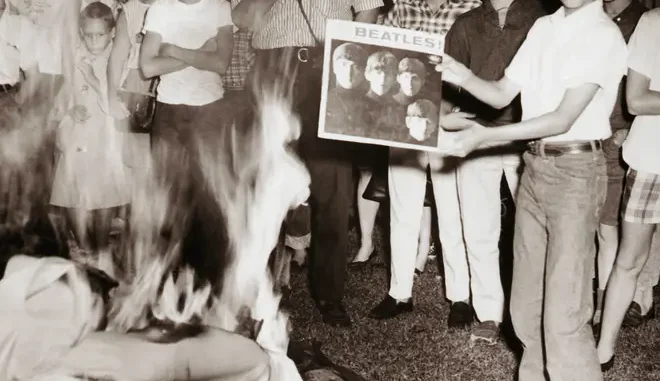
The Beatles rarely put a foot wrong in their relatively short, stunning decade together.
They shrugged off the departure of Pete Best, quickly switched up their shocking “butcher cover”, and kept most of their feuding under wraps until it all eventually fell apart.
But there was one explosive moment that truly changed absolutely everything for the Fab Four.
“What’d you do? Screw up like The Beatles and say you were bigger than Jesus?” Bart Simpson asked Homer about his dad’s barbershop quartet The B-Sharps, proving how the controversy has become so embedded in our culture.
The incident has remained shorthand for The Beatles messing up and maybe the beginning of the end of Beatlemania, in the US at least. But what’s the truth about what really happened? Read on to find out.
Did The Beatles really say they were “bigger than Jesus”?
The first myth around The Beatles’ Jesus controversy is that the quote attributed to the band was totally mangled.
Here’s the exact phrasing of what John Lennon said, and the context.
Christianity will go. It will vanish and shrink. I needn’t argue about that; I’m right and I’ll be proved right. We’re more popular than Jesus now; I don’t know which will go first – rock ‘n’ roll or Christianity. Jesus was all right but his disciples were thick and ordinary. It’s them twisting it that ruins it for me.
When and where did John Lennon say that The Beatles were “more popular than Jesus”?
John Lennon’s comments first appeared in an article in the Evening Standard on March 4, 1966.
It was part of a series of four interviews with each of the band in a series called How Does a Beatle Live? All were written by Maureen Cleave, who had been covering the band for some time there.
Cleave had interviewed John at his Kenwood home in Weybridge, Surrey, and in the article had noted that Lennon had been reading about religion.
What happened when John Lennon’s comments were first published in the UK?
Absolutely nothing, really!
Lennon’s comment about the relative decline of Christianity was far from controversial by 1966, with the Church’s grip on England certainly not what it was, halfway through the Swinging 60s.
It’s worth mentioning that in Cleave’s interview with George Harrison, the guitarist said to little notice: “Why can’t we bring all this out in the open? Why is there all this stuff about blasphemy? If Christianity’s as good as they say it is, it should stand up to a bit of discussion.”
There was apparently one miffed letter to the editor, a droll cartoon by future Pink Floyd and Yes, Minister cartoonist Gerald Scarfe, and that was pretty much that. For a while.
Where did John Lennon’s controversial comments get printed in the US?
You might think that as soon as the comments in question crossed the Atlantic and reached the so-called Bible Belt, things got messy, but it wasn’t really like that.
The same month that the interview had been published in the Standard, US magazine Newsweek referenced Lennon’s remark.
A couple of months later the full interview appeared in Detroit magazine. Again, few seemed to notice or care.
It was only when the Lennon and McCartney interviews were republished in the teen magazine Datebook, having been offered by the Beatles’ own press officer Tony Barrow, that things really kicked off.
Editor Art Unger actually read the interviews, and pulled out a couple of controversial quotes for the cover of the ‘Shout-Out’ issue.
Right there on the cover was John Lennon’s quote: “I don’t know which will go first – rock ‘n’ roll or Christianity!”
The picture on the front wasn’t of John, but of Paul, and his quote on the front was arguably more jaw-dropping, critiquing the racism Stateside by saying of how black people were treated: “It’s a lousy country where anyone black is a dirty n***er!” (and that last word wasn’t starred out, either.)
Who was it who first kicked off about John Lennon’s comments?
Like any good editor looking for attention, Unger sent copies of the interviews far and wide… including to radio stations in the US South.
The first signs of what was to come were when DJs Tommy Charles and Doug Layton at WAQY got ahold of the quotes.
“That does it for me,” Charles said. “I am not going to play the Beatles any more.”
Listeners were asked for their views, and most were anti-Beatles.
“We just felt it was so absurd and sacrilegious that something ought to be done to show them that they can’t get away with this sort of thing,” Charles was later quoted as saying.
The news spread, especially after a New York Times story on August 5, and things were only going to get bigger.
The controversy spread, and fast. Over 30 other stations decided to stop playing The Beatles records.
Not content with just ripping up their own vinyl, WAQY hired an actual woodchipper and asked listeners to send in their Beatles memorabilia.
KCBN in Reno, Nevada took things even further, announcing a public burning of Beatles music and merch on August 6. Other stations did the same.
Similar protests and bands took place in Christian countries like Mexico, South Africa and Spain.
Even the Vatican got in on the act, pronouncing: “Some subjects must not be dealt with profanely, not even in the world of beatniks.”
Leave a Reply